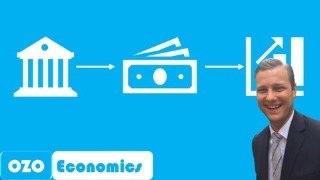Central Banks and Quantitative Easing
Learn how quantitative easing (money printing) impacts the economy and financial markets. Understand the risks and implications of central bank policies, including asset bubbles and inflation. Suitable for finance professionals, students, and investors. Gain confidence in navigating financial news.
What you’ll learn
- How quantitative easing (money printing) works
- Central bank policy tools
- US Fed’s response to COVID-19 and Financial Crisis of 2008
- The impact of quantitative easing on S&P 500 and US Treasury Yields
- US Federal funds market and funds market rate (inter-bank lending market)
- US Fed’s open market operations (asset purchases and disposals)
- Why investors fear inflation
- Inverse relationship of bond price and its yield
- How central banks risk creating asset bubbles
- Money multiplier
Quantitative easing is made simple, easy and fun to learn
The importance of central banks has grown exponentially over the last 15 years and this is why this new economic reality is not well covered at universities, business schools, work or online.
This is a unique and differentiated set of lectures which will help you better understand how US central bank drives the economy and financial markets including stocks, bonds and real estate. You will learn about the limitations of central bank policy and key risks that arise from quantitative easing.
By the end of this course you will be able to:
Navigate through financial news with confidence
Explain the implications of announcements made by central banks
Learn how quantitative easing (money printing) affected S&P 500, bond yields and inflation between 2007 and 2020.
Talk about US Fed’s response to 2020 COVID-19 pandemic and 2008 Global Financial Crisis
Learn why investors fear future inflation: 2021-2025
Understand what drives interest rates and bond prices in the economy
Learn how central banks risk creating asset bubbles
Gain the understanding of federal funds market (inter-bank lending market)
Acquire knowledge of open market operations (central bank asset purchases and disposals)
Grasp the inverse relationship between bond yields and bond prices
Understand the basics of money multiplier
Gain the understanding of future economic and financial market outlook
Who this course is for:
- Finance professionals
- Consultants
- Accountants
- Students
- Investors







